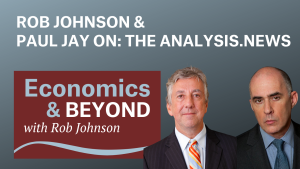But since that time, financial institutions have shored up their balance sheets as their earnings and capital cushions have improved and leverage ratios have shrunk. In short, banks today are safer than they were before the crash. So surely trust should have returned as the likelihood of systemic collapse declined.
Many people in the financial sector feel this distrust. But they aren’t sure what to do about it. How can they win back the public’s trust? Aren’t record profits enough?
Apparently, there are some things that money can’t buy.
Trust is an essential part of a functioning economy. It provides an antidote to the fundamental uncertainty that is part of any economic decision. Without trust, you would likely spend all of your energy and resources protecting yourself rather than working on productive activities.
For the financial sector, trust is especially important. Finance is the nerve center of our economy, and trust is an essential component of the financial system. As we saw in 2008, without trust and a properly functioning financial system the economy breaks down. If people don’t trust in financial institutions, the entire economic system can be thrown out of balance.
This lack of trust leads to many dysfunctional symptoms. When people don’t trust where to put their savings, they hoard cash, or commodities like gold, which reached its highest price in history in the aftermath the 2008 crisis. Similarly, when trust in the financial sector is low, corporations also are more likely to hoard cash and less likely to invest in expansion or hire new employees, leading to stagnant economic growth and persistent unemployment.
Despite the financial sector’s economic resurgence, we are still dealing with these economic problems today. The situation is a reflection of the distrust the public still feels for our financial institutions.
After 2008, when so many banks were rescued the public rightly felt that it was owed systemic reform so it wouldn’t be put in the position of having to rescue the financial sector again. And while there has been an increase in regulation with Dodd-Frank, none of the changes have addressed the fundamental issues underpinning the lasting distrust in the financial system. I’m talking about major obstacles such as too big to fail, derivatives regulation, and the revolving door between regulators and those they are supposed to regulate. Eric Holder’s comment before the United States Senate in March of this year that some banks are simply too big to effectively prosecute suggests that the system is still very far out of balance.
So while profits have returned, if the financial sector wants to regain the public’s trust, it needs to offer something more than earnings reports.
That’s because of the persistent belief that the financial sector is functioning less like the nerve system of the economy and more like an autoimmune disease feeding on its host. This perception is not entirely unjustified. Large multinational banks have been forced to pay billions of dollars in fines for misdeeds leading up to and during the crisis. And yet fundamental change remains illusive in the industry. As Holder’s comments suggest, the ungovernability of some of the most powerful entities in our society is a big barrier to reestablishing trust in our financial system.
While some in the financial sector may profess dismay at this state of affairs, most of the leaders of behemoth banks have shown themselves more eager to coerce the process rather than agreeing to necessary reform.
For example, consider the way underwater mortgage holders were treated when the housing market collapsed. After already being bailed out by the public, the banks preached forbearance in mortgage markets because of their still-fragile balance sheets. Yet, at the same time these same banks still were offering their employees sizeable bonuses, even though the hole in the mortgage market could have been substantially reduced by the more than $100 billion these firms handed out over the last five years.
If our society had operated under a different set of priorities and required banks to put these funds into helping underwater borrowers instead of toward bonuses for many of the same people who helped sink the system in 2008, the hole in the mortgage market would no longer exist, there would be no need for forbearance, and our economy would be in much better shape. But that’s not what happened.
As long as this Wall Street versus Main Street dynamic persists, so too will the belief that the financial sector plays by a different set of rules, rules tilted in their favor at the expense of the rest of us.
In order to regain the public’s trust, the financial sector must show itself willing to take meaningful steps to address this concern. It must show the public that it is worthy of its trust by accepting meaningful reform for the good of our society. Until that happens, all of the profits and equity financing in the world won’t win back the kind of trust that is essential for the financial sector to serve its role at the center of our economy.
This situation isn’t “heads I win, tails you lose.” In this scenario, we all lose. Persistent anger and mistrust cannot be good for anyone. We can do better.






